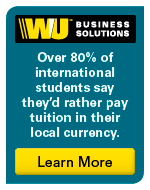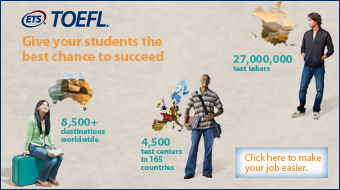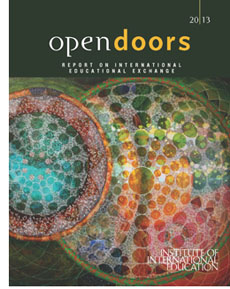
| IIE Home | Membership | Publications | Open Doors | Contact Us | Subscribe |
|
||
|
News
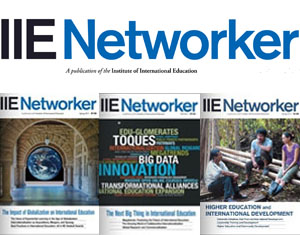 Submission Deadline: May 23, 2014
According to the 2013 Open Doors Report, 295,000 American college students studied abroad for credit and in non-credit programs. This represents only 10 percent of students who graduated with associates or baccalaureate degrees. In today’s increasingly global workplace, the number is far too low. Globalization brings with it the demand for a U.S. workforce that both possesses knowledge of other countries and cultures and is competent in languages other than English. International experiences are among of the best ways students can acquire these global skills. In response to this need, IIE recently launched Generation Study Abroad, which seeks to double the number of U.S. students who study abroad by the end of the decade. The initiative will reach out to educators at all levels and stakeholders in the public and private sectors and to encourage meaningful, innovative action in order to drive up the number of U.S. students who have the opportunity to gain international experience through academic study abroad programs, internships, service learning, and non-credit educational experiences.
The purpose of this issue of the IIENetworker is to highlight current best practices and to explore bold new ideas to help us reach this ambitious goal. Proposed articles should examine ways to identify and break down barriers (perceived and real) hindering students from participating in an international experience, such as obstacles related to cost, curriculum, and culture; share successful strategies and best practices in increasing study abroad; or discuss ideas for improving study abroad experiences for students already taking part. Articles on expanding diversity in race and ethnicity, academic disciplines, and gender are strongly encouraged. We also encourage contributions from professionals outside the strictly higher education structure, including those in K-12, language learning, and the private and government sectors. Articles should be between 1000 and 1500 words.
Please let us know as soon as possible if you plan to submit. The submission deadline for completed articles is May 23, 2014. You will be notified as soon as a publication decision is made.
If you are interested in submitting an article for the spring 2014 issue of IIENetworker, please address all inquiries to jgrosh@iie.org. For more information on IIENetworker, please visit: www.iie.org/iienetworker.
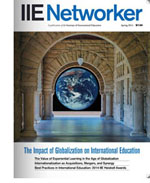 In an article featured in the spring 2014 IIENetworker magazine released last week, Jenny J. Lee, Associate Professor at the University of Arizona, applies three metaphors—acquisitions, mergers, and synergy—to explore common institutional approaches to internationalization. "More than ever before, international education is being perceived as a major export," observes Lee, who makes the case that "internationalization is not simply the means to something else but a worthy goal in and of itself." The U.S. Study Abroad Survey captures data on U.S. students traveling abroad for academic credit and is part of our annual Open Doors Report on International Educational Exchange. The compilation of data published in Open Doors is only possible with the assistance of international education and other higher education professionals at institutions throughout the United States who voluntarily provide their data for aggregate reporting in Open Doors.
The Open Doors Report, supported by the Bureau of Educational and Cultural Affairs of the U.S. Department of State, has long been regarded as the authoritative source for statistical data on international student flows to the U.S. For more information about Open Doors and to access data highlights, visit our website at www.iie.org/OpenDoors.
If your institution does not currently participate in the surveys, and wishes to do so, please contact us at IIEResearch@iie.org, and we will gladly add your institution to IIE's Open Doors database.
Daniela Kaisth, Vice President for Strategic Development at IIE, writes about her participation in the panel "From Higher Education to Women’s Leadership" convened by the Open a Door Foundation during the 58th Commission on the Status of Women (CSW) at the United Nations. "The real star of the show was Simin Wahdat," writes Kaisth, who shares the Open a Door alumna’s story of her journey from Afghanistan to the United States.
Department of Treasury announced a new policy today that provides a general license authorizing accredited U.S. academic institutions to establish and operate undergraduate and graduate academic exchange agreements with Iranian universities, including the provision of scholarships to participating Iranian students.
It also authorizes the export to Iran of certain additional educational services by U.S. academic institutions, including the provision of certain on-line courses, and by U.S. persons for certain academic study or non-for-profit educational activities in Iran, or the administration of university entrance and other examinations for Iranian students.
The Report of the High-Level Panel of Eminent Persons on the Post-2015 Development Agenda proposes 12 major development goals divided into 54 sub-goals, none of which mention higher education. "The importance of higher education to achieving the old and new Millennium Development Goals is evident," writes Ad Boeren for University World News. "As such higher education should feature in post-2015 development agendas and be integrated in programmes that aim to achieve the goals."
Conferences
April 2, 2014; 7:30 PM EDT (April 3, 2014; 8:30 AM JST)
Registration Deadline: April 1, 2014 | Register Online
Ambassador Caroline Kennedy will be joined by representatives from EducationUSA and the Embassy’s Public Affairs, Commercial, and Consular sections to discuss trends and opportunities in the education and exchange sector in Japan. Specific topics will include student recruiting events in Japan, building U.S.-Japan Institutional Partnerships, the market in Japan, and relevant visa application processes. Following the presentation attendees will have an opportunity to participate in the Q&A portion of the Direct Line call.
June 10-13, 2014 | University of Toronto, Canada
Early Bird Registration Deadline: April 11, 2014 | Registration and Conference Details
The scope of the Global Internship Conference (GIC) includes, but is not limited to, professionals and researchers who work in the field or seek to learn more about internships, academic work placement, co-operative education, teaching, and volunteering. As a platform for dialogue, and vehicle for action, the Global Internship Conference brings together colleagues to discuss and advance best practices as well as develop and examine a research agenda for global internships.
The 2014 conference will be held in Canada, a country with a long-standing history of, and significant contributions in co-op education with work placements designed into the curriculum. The theme of this year’s conference is "Internships, Co-op, Experiential Education—Where Next?" The discounted rate is $500 for Non-Profits, $600 for Corporations, and $1,050 for Exhibitors.
August 20-23, 2014 | Johannesburg, South Africa
Submission of Proposals Deadline: April 30 | Submission and Conference Details
IEASA is seeking abstracts for workshops and conference sessions and participate in its 18th Annual Conference: The Internationalization of Higher Education in a World of Geo-political Reorganization.
The conference will be run on three tracks focusing on:
The IEASA conference provides the ideal opportunity to present and share your ideas and experiences, research findings and to discuss professional issues relevant to the theme.
HKU Summer Institute in Hong Kong
June 16-25, 2014 | Institute and Application Details
Exchange and share visions, insights, experiences and challenges among leaders in higher education systems and institutions across Asia in 2 weeks.
Why participate?
Who should join the Summer Institute?
HKU Asian Higher Education Summit | June 26-27, 2014
Summer Institute participants are invited as observers. The Asian Higher Education Summit is organized at the point when most Asian nations are actively developing their higher education systems. It will lead to a community of higher education leaders in Asia. Participants of the round-table discussion will include established higher education leaders on salient issues of common concern.
Deadlines
Application Deadline: June 15, 2014 | Application and Program Details
The Global Competence Certificate (GCC) Program is the first-of-its-kind online graduate level certificate program in global competence education for in-service K-12 teachers. The GCC combines engaging online coursework, immersive fieldwork with partners across the globe, and collaborative practice groups with peers nationwide to help educators integrate global competence into their practice, while building engaging and relevant instructional methodology.
Developed by Teachers College, Columbia University, World Savvy, and Asia Society, the program is facilitated by Teachers College faculty and renowned educators from across the country. Participants may choose to earn a Certificate in Global Competence plus either 48 Continuing Education Units or 12 Graduate Credits. The 2014-15 program runs September 2014– December 2015.
Application Deadline: July 1, 2014 | Application and Fellowship Details
The Rotary Foundation is now accepting applications for the world-competitive Rotary Peace Fellowship. The fellowship provides academic and practical training to prepare scholars for leadership roles in solving conflicts around the world.
Up to 100 fellows are selected every year in a globally competitive process based on personal, academic, and professional achievements. Fellows earn a master’s-level degree or a professional development certificate in peace and conflict studies at one of six Rotary Peace Centers at leading universities in Australia, England, Japan, the United States, Sweden, and Thailand.
Fulbright
Application Deadline: May 2, 2014 | Application and Position Details
The Binational Fulbright Commission in Egypt was established in 1949, and is the oldest and largest Fulbright program in the Arab world. The Commission administers more than 15 distinct Fulbright programs, providing Fulbright awards to nearly 100 American or Egyptian scholars, students, and professionals each year.
The Executive Director will supervise a team-oriented staff of 23 professionals in planning, implementing and evaluating the Commission's Fulbright exchange programs, and lead the Binational Fulbright Commission in Egypt in redefining itself to address the new reality in Egypt and the resulting new binational relationship. Responsibilities include:
Partnerships
In a recent article in the Chronicle of Higher Education, University of Tulsa’s Cheryl Matherly describes three specific lessons learned in seeking partnerships with Indian institutions as part of IIE’s International Academic Partnership Program India. "For many American universities, India remains an opportunity wrapped in a riddle," writes Matherly.
In five years, Columbia University has created a network of eight global centers. Safwan M. Masri, Columbia’s executive vice president for global centers and global development, explains in Inside Higher Ed why an already globally engaged university created these centers: "No. 1 was a concerted strategic effort to facilitate and support the engagement in a structured manner around the world. And No. 2 was a global context for engaging. It’s one thing to engage in East Asia, and to understand and study East Asia as East Asia, and it’s another thing to look at certain issues in East Asia and put them in a global context and be able to do comparative research."
Anne Pakir, director of the International Relations Office at National University of Singapore, writes in Inside Higher Ed about the university’s experience of establishing global partnerships with universities across the world. "To identify the right partners, the proxy is often university reputation. Granted, this can be subjective and intangible, but it certainly has a role to play in decision-making. However, the success of such collaboration is contingent on much more than that."
Study Abroad
Deadline: May 1, 2014 | Find out how you can join this groundbreaking initiative
Generation Study Abroad is a five-year initiative that brings leaders in education, business, and governments together to double the number of U.S. college students studying abroad. Leading up to IIE’s centennial celebration in 2019, Generation Study Abroad will engage educators at all levels and stakeholders in the public and private sectors to drive meaningful, innovative action to increase the number of U.S. students who have the opportunity to gain international experience through academic study abroad programs, as well as internships, service learning and non-credit educational experiences.
IIE has already identified more than 160 lead partners who have committed to specific, measureable actions that will help reach this ambitious goal; the result will be thousands more American students graduating with the international experience necessary for success in a globalized world.
Visit the IIE Press Center to read news stories detailing specific actions of individual commitment partners.
On March 12, 2014, IIE brought together leaders from the public, private and educational sectors for a one-day think tank at its New York headquarters. The objective was to initiate an ongoing discussion on what it will take to double the number of U.S. students who study abroad by the end of the decade. This ambitious goal is the central component to IIE’s newly launched five-year initiative, Generation Study Abroad.
In several brainstorming sessions, participants of the think tank discussed obstacles to studying abroad and ideas to promote study abroad. In the afternoon, participants analyzed the feasibility of the top solutions presented by different groups and shared ideas on how to implement these solutions. "I thought the initiative was an excellent way to bring together different team players within the educational realm in order to develop feasible and sometimes radical ideas that can possibly spark student interest to get a global education and create opportunities for more students to study abroad," Wei-Ee Cheng, Fulbright Distinguished Awards in Teaching Program alumna and Think Tank participant, reflected after the event.
As part of Michelle Obama’s trip to China this week with her daughters, she has been visiting schools and speaking out on the importance of study abroad. The White House worked with CNN to create an "iReport" on the topic, inviting people to submit their study abroad stories and questions for Mrs. Obama. CNN created a video clip showing her answer a few questions, and wrote a story about study abroad with highlights of the responses.
The New York Times has published IIE President and CEO Allan Goodman’s letter to the editor, commenting on Nicholas Kristof’s Sunday column, Go West, Young People! And East! "Nicholas Kristof is correct in saying that study abroad should be part of every college student’s education," writes Dr. Goodman. "We need to shift the paradigm so that study abroad is seen by all stakeholders — including parents, educators and employers — as essential so that students go to college wondering not if they will go abroad but when."
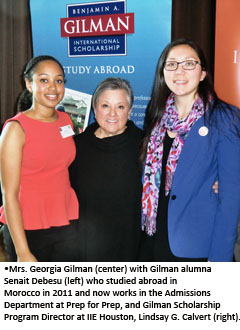 On Tuesday, March 18, 2014 the U.S. Department of State’s Gilman International Scholarship Program hosted the second networking event in New York City, co-sponsored by the Fulbright U.S. Student Program and hosted at the Institute of International Education (IIE) in New York City. Over fifty U.S. Department of State alumni from the Gilman Scholarship, Fulbright, Critical Language Scholarship, National Security Language Initiative for Youth (NSLI-Y) and American Youth Leadership programs learned of governmental and diplomatic career, as well as more international exchange opportunities to enhance their academic studies and careers. These alumni of the Department of State’s Bureau of Educational and Cultural Affairs (ECA) programs ranged from current students to employed professionals, who were eager to meet fellow alumni and special guests, including Diplomat in Residence of the NY Metro Region, Patricia Guy; Mrs. Georgia Gilman, Chair of the Gilman Group and wife to Honorable Benjamin A. Gilman for whom the scholarship is named; and IIE Trustees and staff. On Tuesday, March 18, 2014 the U.S. Department of State’s Gilman International Scholarship Program hosted the second networking event in New York City, co-sponsored by the Fulbright U.S. Student Program and hosted at the Institute of International Education (IIE) in New York City. Over fifty U.S. Department of State alumni from the Gilman Scholarship, Fulbright, Critical Language Scholarship, National Security Language Initiative for Youth (NSLI-Y) and American Youth Leadership programs learned of governmental and diplomatic career, as well as more international exchange opportunities to enhance their academic studies and careers. These alumni of the Department of State’s Bureau of Educational and Cultural Affairs (ECA) programs ranged from current students to employed professionals, who were eager to meet fellow alumni and special guests, including Diplomat in Residence of the NY Metro Region, Patricia Guy; Mrs. Georgia Gilman, Chair of the Gilman Group and wife to Honorable Benjamin A. Gilman for whom the scholarship is named; and IIE Trustees and staff.Dr. Allan Goodman, President and CEO of IIE, gave welcoming remarks recounting a story of a Gilman alumnus whose study abroad experience in Thailand sparked business changes in his mother’s cleaning company in the U.S and his own personal career in Washington, DC. Mrs. Gilman expressed her happiness with the tremendous growth and impact of the Gilman Scholarship Program and to have the opportunity to meet with so many young, bright alumni. Lindsay G. Calvert, Director of the Gilman Scholarship Program at IIE Houston, informed alumni of how to remain engaged with their alumni community in the city, through connecting with their program and Department of State social media and alumni groups (including the International Exchanges Alumni website), and through the IIE Generation Study Abroad campaign. Alumni had the chance to network within career interest groups, including U.S. Department of State and government careers by speaking with Diplomat in Residence Patricia Guy. IIE/Fulbright staff were able to answer questions for those interested in continuing their international exchange experiences. In addition, a photo booth was set up to allow alumni to share their stories and take photos stating their affiliation with #GenerationStudyAbroad.
This event inspired the alumni of these prestigious U.S. Department of State sponsored scholarships to become more active in their community and within their alumni networks, as well as consider further international opportunities to enhance their academic and professional careers. The Gilman Scholarship Program will continue to host these networking receptions across the U.S. and to speak with more alumni of these Department of State programs in order to connect them to a larger network, including other career diplomats, Foreign Service Officers, distinguished leaders and members of the Institute of International Education.
Scholar Rescue Fund
This week marks the beginning of the fourth year of the Syrian conflict. The death toll has climbed to well over 100,000 while the number of Syrians displaced from their homes nears a staggering 7 million. A third of these are refugees who have fled their country in search of safety. Syria's higher education system has been a victim of the conflict as well with university campuses scarred by bombardments and clashes; professors killed, kidnapped, and forced to flee; and thousands of students now unable to continue or begin university programs vital to their future careers.
The Institute of International Education's Scholar Rescue Fund (IIE-SRF) assists Syrian professors and researchers whose positions as guarantors of the free expression of ideas increase their risk of being targeted. For students affected by the conflict, IIE's Syria Consortium coordinates a network of over 50 universities pledging scholarship support.
As we reflect on the magnitude of the devastation and remember lives lost, we thank our academic partners and the donor community for their support and invite you to join our collective efforts to help provide vital assistance to Syrian women and men across diverse ethnic, religious, and academic affiliations to continue their research and writing in safe, academically rigorous environments worldwide.
Please join us by referring a scholar in need of assistance, offering to host a scholar in a temporary academic position, or donating funds to ensure that IIE-SRF is able to assist as many scholars as possible. It is our hope that these efforts will help to preserve the Syrian academy, a core element of the country's future.
|
| www.iie.org/iienetwork • Member website of the Institute of International Education © 2025 Institute of International Education. All rights reserved. |

